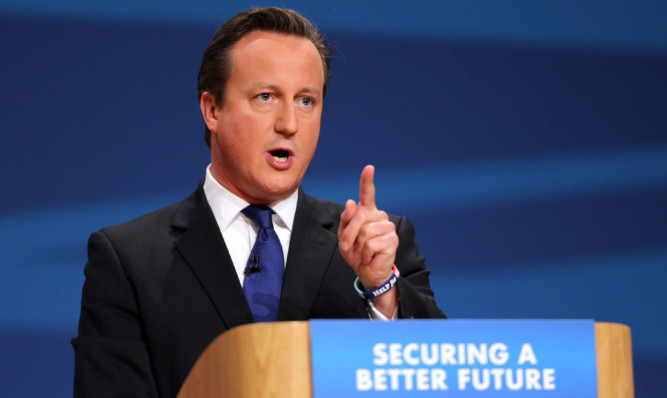
In an exclusive interview, the Prime Minister dismisses claims tax cuts are unaffordable while the nation’s finances remain in a mess.
David Cameron has set out his stall ahead of next year’s election claiming there’s a “moral case” for making tax cuts and that the vote will be a straight choice between him and Ed Miliband.
Speaking exclusively to The Sunday Post the Prime Minister revealed statistics showing nearly 300,000 people in Scotland alone will pay no more tax under Tory plans to raise the personal allowance the point at which workers start paying tax on their wages to £12,500.
Across the north of England half a million people would be lifted out of the tax system.
He said: “I think it’s right for Britain to be a low tax economy to make us more competitive but more importantly I think there’s a very strong moral argument.
“The British people have worked very hard to get us out of this recession, to get our economy growing to get things moving again and I think it’s right to leave more of their hard earned money with them so they can choose how to spend it on the things they choose rather than the government take it away and spend it on their behalf.
“So I think there’s a very strong moral case for tax cuts in the next parliament.”
And he dismissed claims tax cuts are unaffordable while the nation’s finances remain in a mess.
He added: “Of course people say how can you cut taxes at the same time as cutting services. In this parliament we have had to take very difficult spending decisions, we’ve taken something like £100 billion out of public spending but we’ve done that at the same time as reducing people’s taxes because we’ve raised the personal allowance from something like £6000 to something like £10,000.
“I think it demonstrates that if you run the economy well, if you’re careful with people’s money you can have good public services and leave people with more of their own money to choose.”
And, in a warning to Scots voters planning to back the SNP next year, he set out the Tories electoral stall for 2015.
He said: “The real choice at the next election which will be a choice between an Ed Miliband government in office in Westminster or a David Cameron government in Westminster.”
Since the referendum campaign Cameron’s personal poll ratings have consistently been better than those of his Labour rival in Scotland.
He’s been widely commended for his interventions in the run up the independence poll which included a remarkable speech in which he referred to his own party as “the effing Tories”.
He explained: “The point I was making then is that of course there are some people in Scotland who don’t like the Conservatives.
“If you don’t like the Conservatives that’s not a reason to break up the UK. That was a decision for life not the next 5 years.
“We’ll go into the next election with a very strong Scottish leader in Ruth Davidson who came out of that referendum very strongly.
“We go in unashamedly as a party of the UK, campaigning to keep the nations of the UK together and we will always do so and I think we’ve got a spring in our step.”
One personal reason Cameron might want to win next year is to see the back of Shadow Chancellor Ed Balls who winds him up weekly with a series of hand gestures during Prime Minister’s Questions.
Cameron sighed: “I don’t know why I let him annoy me. He’s just so annoying. Privately I have had a civilised conversation with him, once or twice.
“But in the House of Commons he knows he’s annoying me so he keeps on doing it.”
But Cameron relaxed enough while praising Chancellor George Osborne’s plans to devolve more power to the cities in the north of England and push ahead with a high speed rail line linking them to joke about a recent security scare when a man evaded the PM’s phalanx of security men are barged into him.
He said: “Take the 13 year period of Labour, for every 10 jobs created in the South there was only one job created in the North. I think our record is rather different. The work that the Chancellor and I are doing on improving infrastructure in the North of England is absolutely fundamental to the future of the country.
“We really do believe in rebalancing the economy. I think that linking together the cities of the North of England to create a powerhouse, to create a counterpoint to London is a really important vision.
“I sensed a real enthusiasm for this whole agenda, before I bumped into a jogger in Leeds, and all credit to the Chancellor for championing it.”

Enjoy the convenience of having The Sunday Post delivered as a digital ePaper straight to your smartphone, tablet or computer.
Subscribe for only £5.49 a month and enjoy all the benefits of the printed paper as a digital replica.
Subscribe